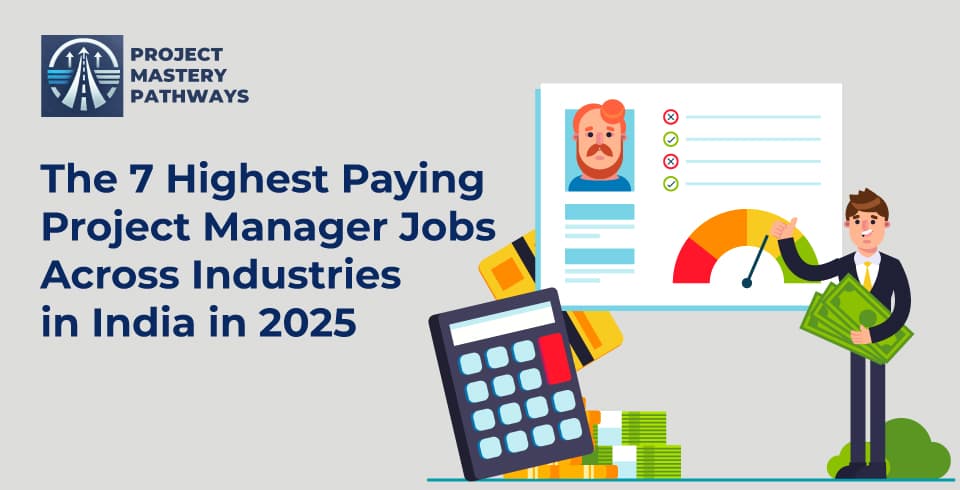“I’ve been managing projects for three years now, but my salary hasn’t grown the way I expected.”
Does this sound familiar? You’ve invested time and effort building your project management skills, perhaps even earned certifications, yet you’re watching peers in other industries pull significantly higher salaries. The frustrating part? You’re doing similar work—managing timelines, budgets, stakeholders, and teams—but the compensation differs dramatically based on which industry you’re in.
Here’s what most project managers don’t realize: your industry choice impacts your earning potential more than almost any other factor. Two project managers with identical skills and experience can have salary differences of 50% or more simply because one chose IT while the other went into manufacturing. By the end of this blog, you’ll discover which industries offer the most lucrative project management opportunities in India, what makes these roles highly compensated, and how to position yourself for these high-paying positions.
Understanding the Project Manager Salary Landscape in India
Before diving into specific industries, let’s establish the baseline. According to recent salary surveys and industry reports, the average project manager salary in India ranges from ₹8 lakhs to ₹25 lakhs per annum, depending on experience, location, and industry. However, this broad range tells only part of the story.
Entry-level project managers (0-3 years of experience) typically earn between ₹6-12 lakhs annually, while mid-level professionals (4-8 years) command ₹12-20 lakhs. Senior project managers and program managers (8+ years) can earn ₹20-40 lakhs or more, with some reaching ₹50+ lakhs in premium industries and organizations.
Geographic location significantly influences compensation. Metropolitan cities like Bangalore, Mumbai, Pune, Hyderabad, and Gurgaon offer 20-40% higher salaries compared to Tier-2 cities, primarily due to cost-of-living differences and concentration of high-paying industries. For a comprehensive breakdown of project manager salaries in India, including city-wise comparisons and experience-based ranges, you can explore detailed salary data that helps you benchmark your compensation.
However, the real differentiator isn’t geography or experience alone—it’s the industry you choose. Certain sectors consistently pay premium salaries for project management talent because of the complexity, business criticality, regulatory requirements, or profit margins associated with their projects. Let’s examine which industries lead the pack.
IT and Technology Sector: The Consistent Leader in PM Compensation
The Information Technology sector remains the undisputed champion for project manager salaries in India. Digital transformation projects, enterprise software implementations, cloud migrations, and product development initiatives command premium compensation due to their strategic importance and revenue impact.

Software development project managers in product companies typically earn ₹15-35 lakhs annually, with senior roles at tech giants like Google, Microsoft, Amazon, and leading Indian IT firms reaching ₹40-60 lakhs or more. These roles require understanding of software development lifecycles, Agile methodologies, DevOps practices, and technical architecture—making specialized IT certifications for project management particularly valuable.
Enterprise IT project managers who lead large-scale implementations of SAP, Oracle, Salesforce, or custom enterprise solutions earn ₹18-40 lakhs, with total compensation packages including performance bonuses and stock options often exceeding ₹50 lakhs for experienced professionals. These roles demand both technical acumen and business process expertise, as they’re transforming how organizations operate.
Digital transformation project managers are among the highest paid, commanding ₹25-50 lakhs annually. These professionals lead strategic initiatives that modernize entire business operations—moving legacy systems to cloud platforms, implementing AI and machine learning solutions, or creating digital customer experiences. The combination of technical complexity, change management challenges, and direct impact on business competitiveness justifies the premium compensation.
The IT sector’s salary advantage stems from several factors: high profit margins in technology companies, global competition for talent, critical business dependency on technology projects, and the rapid pace of innovation requiring specialized knowledge. Additionally, successful IT project delivery directly impacts revenue generation and market competitiveness, making skilled project managers invaluable assets.
Financial Services and Banking: Premium Pay for High-Stakes Projects
India’s banking, financial services, and insurance (BFSI) sector offers exceptional project management compensation, particularly for regulatory compliance, core banking transformations, and digital banking initiatives.
Banking technology project managers who lead core banking system upgrades, payment platform implementations, or digital banking launches typically earn ₹18-40 lakhs annually. These projects involve millions of transactions, stringent regulatory requirements, and zero tolerance for errors—making experienced project managers worth their premium salaries.
Fintech project managers in India’s booming financial technology sector command ₹20-45 lakhs, especially those with experience in payment systems, lending platforms, wealth management applications, or blockchain-based financial solutions. The intersection of finance domain knowledge and technology expertise creates scarcity, driving up compensation.
Regulatory and compliance project managers in financial institutions earn ₹15-35 lakhs, leading initiatives around RBI guidelines, data privacy regulations, anti-money laundering systems, or Basel III implementations. These roles require deep understanding of financial regulations alongside project management expertise.
Risk management project managers who implement enterprise risk frameworks, credit risk systems, or operational risk monitoring solutions earn ₹18-38 lakhs. The critical nature of risk management in financial institutions, where project failures can result in regulatory penalties or financial losses, justifies significant investment in skilled project leadership.
The BFSI sector’s high compensation reflects the stakes involved—projects directly impact millions of customers, handle sensitive financial data, must comply with complex regulations, and can’t afford failures. Additionally, the sector’s profitability allows for competitive compensation packages to attract and retain top project management talent.
Pharmaceutical and Healthcare: Specialized Knowledge Commands Premium
India’s pharmaceutical industry, combined with healthcare technology projects, offers lucrative opportunities for project managers with specialized domain knowledge.
Clinical trial project managers who oversee drug development trials, regulatory submissions, and medical research initiatives earn ₹18-40 lakhs annually. These roles require understanding of Good Clinical Practice (GCP) guidelines, regulatory frameworks like USFDA and European Medicines Agency requirements, and the ability to manage complex multi-site international trials.
Pharmaceutical manufacturing project managers leading new plant setups, capacity expansions, or technology upgrades in manufacturing facilities earn ₹16-35 lakhs. These projects must meet stringent quality standards (Good Manufacturing Practice), navigate regulatory approvals, and deliver within tight timelines to capture market opportunities for new drugs.
Healthcare IT project managers implementing hospital information systems, electronic health records, telemedicine platforms, or healthcare analytics solutions command ₹15-35 lakhs. The combination of healthcare domain knowledge and technology expertise, along with patient safety implications, creates premium value for skilled project managers.
Medical device project managers who lead development and commercialization of medical devices, diagnostic equipment, or healthcare instruments earn ₹18-38 lakhs. These roles require navigating complex regulatory pathways, quality management systems, and clinical validation processes.
The pharmaceutical and healthcare sector’s premium compensation reflects the specialized knowledge required, regulatory complexity, patient safety stakes, and the high-value nature of successful projects. A new drug launch or successful medical device can generate billions in revenue, making investment in expert project management worthwhile.
Infrastructure, Construction, and Real Estate: Large-Scale Projects, Large Salaries
India’s infrastructure boom creates substantial demand for experienced project managers who can deliver complex construction and development projects.
Infrastructure project managers leading highways, metro rail systems, airports, or smart city initiatives typically earn ₹15-40 lakhs annually, with mega-project managers at leading firms earning ₹45 lakhs or more. These roles involve managing budgets in hundreds of crores, coordinating multiple contractors and government agencies, and delivering visible public infrastructure with strict timelines.
Commercial real estate project managers overseeing office complexes, shopping malls, or mixed-use developments earn ₹18-38 lakhs. These projects require balancing developer profitability, regulatory approvals, quality standards, and tight market windows—making experienced project managers valuable assets.
Industrial and manufacturing plant project managers who lead greenfield or brownfield industrial facility projects earn ₹16-35 lakhs. These roles demand technical understanding of manufacturing processes, civil and mechanical engineering basics, and ability to coordinate multiple engineering disciplines. Professionals with relevant certifications for construction project management often command higher compensation due to specialized expertise.
Urban development project managers working on township developments, affordable housing projects, or integrated city projects earn ₹15-32 lakhs, with senior roles at major real estate developers commanding higher packages.
The construction and infrastructure sector’s compensation reflects project scale (often ₹100 crore+), long timelines (2-5 years), complexity of stakeholder management (government, contractors, consultants, community), and the tangible, lasting impact of deliverables. Successful project delivery directly impacts company profitability and reputation.
Additional High-Paying Industries and Strategic Career Moves
Beyond the top four sectors, several other industries offer attractive project management compensation in India.
Management consulting project managers at firms like McKinsey, BCG, Bain, Deloitte, or Accenture earn ₹20-45 lakhs or more, leading transformation projects for client organizations. These roles combine strategy, change management, and project delivery, requiring exceptional analytical and stakeholder management skills.
Telecommunications project managers overseeing 5G rollouts, network expansion, or digital service launches earn ₹15-35 lakhs. The technical complexity and market competition in telecom justify premium compensation for successful project delivery.
Automotive and manufacturing project managers, especially in electric vehicle projects, smart manufacturing initiatives, or new model launches, command ₹14-32 lakhs. India’s growing automotive sector and manufacturing hub status create demand for skilled project leaders.
Energy and utilities project managers leading renewable energy projects (solar, wind), power plant installations, or smart grid implementations earn ₹15-35 lakhs, reflecting the sector’s capital intensity and technical complexity.
Positioning yourself for high-paying roles requires strategic career planning. First, gain foundational project management experience, then specialize in a high-paying industry. Invest in relevant certifications—a PMP certification remains highly valued across industries, while industry-specific certifications (IT, construction, healthcare) add specialized credibility.
Build domain expertise alongside project management skills. An IT project manager who understands cloud architecture, cybersecurity, or data analytics is more valuable than one with only generic PM skills. Similarly, a pharmaceutical project manager with regulatory knowledge or a construction PM with an engineering background commands premium compensation.
Network strategically within your target industry, stay updated on industry trends and challenges, and demonstrate business impact in your current role. Employers pay premium salaries for project managers who don’t just deliver projects on time and budget, but drive measurable business results—revenue growth, cost savings, market share gains, or competitive advantages.
Ready to accelerate your journey toward high-paying project management roles? Subscribe to PMPwithRay for industry insights, career strategies, and practical guidance on positioning yourself for premium project management opportunities across sectors. For comprehensive training that builds the foundational and advanced skills valued by high-paying industries, explore my courses on Udemy, including the PMP Certification Exam 35 PDU Training that demonstrates commitment to professional excellence, and Project Management Basics for Project Managers that establishes the strong foundation needed for career growth in any industry.

